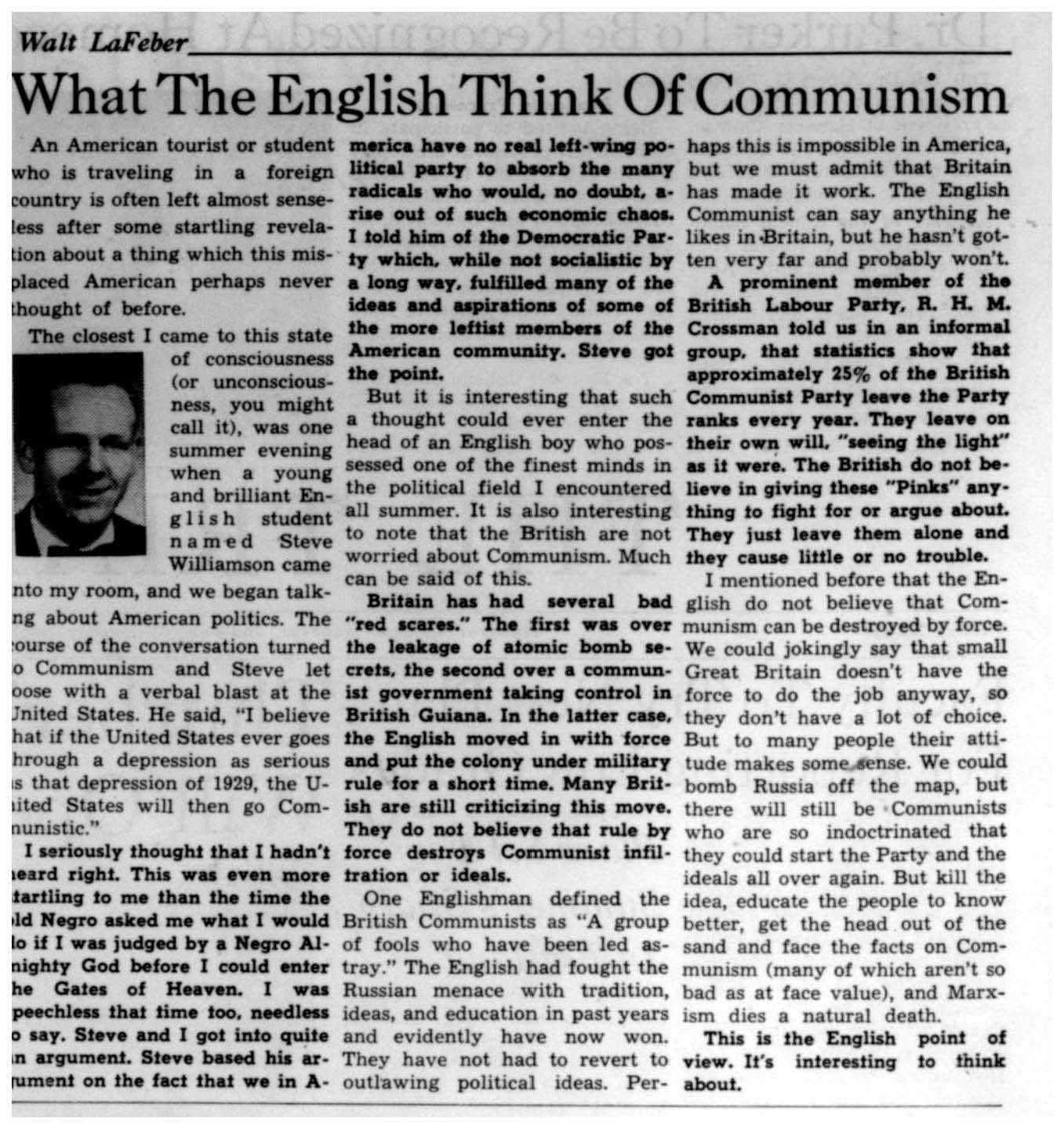
Re-Integrating Hanover College
This article, transcribed from the Hanover College Triangle,
is part of a collection of primary sources on
the re-integration of Hanover College in the 1950s and
1960s. The original Triangles are
available at the Duggan Library Archives, Hanover College
(Hanover, Ind.).
For other articles and oral history transcripts, see the
Table
of Contents.
For more on the people, places, and events discussed in them,
see the Guide.

Walt Lafeber, "What the English Think of Communism," Hanover
College Triangle, 29 Aug. 1954, p. 2.
An American tourist or student who is
traveling in a foreign country is often left almost senseless after some
startling revelation about a thing which this misplaced American perhaps
never thought of before.
The closest I came to this state of
consciousness (or unconsciousness, you might call it), was one summer
evening when a young and brilliant English student named Steve Williamson
came into my room, and we began talking about American politics. The
course of the conversation turned to Communism and Steve let loose with a
verbal blast at the United States. He said, "I believe that if the United
States ever goes through a depression as serious as that depression of
1929, the United States will then go Communistic."
I seriously thought I hadn't heard right.
This was even more startling than the time the old Negro asked me what I
would do if I was judged by a Negro Almighty God before I could enter the
Gates of Heaven. I was speechless that time too, needless to say. Steve
and I got into quite an argument. Steve based his argument on the fact
that we in America have no real left-wing political party to absorb the
many radicals who would, no doubt, arise out of such economic chaos. I
told him of the Democratic Party which, while not socialistic by a long
way, fulfilled many of the ideas and aspirations of some of the more
leftist members of the American community. Steve got the point.
But it is interesting that such a thought
could ever enter the head of an English boy who possessed one of the
finest minds in the political field I encountered all summer. It is also
interesting to note that the British are not worried about Communism. Much
can be said of this.
Britain has had several bad "red scares." The
first was over the leakage of atomic bomb secrets, the second over a
communist government taking control in British Guiana. In the latter case,
the English moved in with force and put the colony under military rule for
a time. Many British are still criticizing this move. They do not believe
that rule by force destroys Communist infiltration or ideals.
One English man defined the British
Communists as "A group of fools who have been led astray." The English had
fought the Russian menace with tradition, ideas, and education in past
years and evidently have now won. They have not had to revert to outlawing
political ideas. Perhaps this is impossible in America, but we must admit
that Britain has made it work. The English Communist can say anything he
likes in Britain, but he hasn't gotten very far and probably won't.
A prominent member of the British Labour
Party, R. H. M. Crossman told us in an informal group, that statistics
show that approximately 25% of the British Communist Party leave the Party
ranks every year. They leave on their own will, "seeing the light" as it
were. The British do not believe in giving these "Pinks" anything to fight
for or argue about. They just leave them alone and they cause little or no
trouble.
I mentioned before that the English do not
believe that Communism can be destroyed by force. We could jokingly say
that small Great Britain doesn't have the force to do the job anyway, so
they don't have a lot of choice. But to many people their attitude makes
some sense. We could bomb Russia off the map, but there will still be
Communists who are so indoctrinated that they could start the Party and
the ideal all over again. But kill the idea, educate the people to know
better, get the head out of the sand and face the facts on Communism (many
of which aren't so bad as at face value), and Marxism dies a natural
death.
This is the English point of view. It's
interesting to think about.

Hanover Historical Texts
Project
Hanover College Department of
History
Hanover
College Visitor's Page
Please send comments to: historians@hanover.edu


